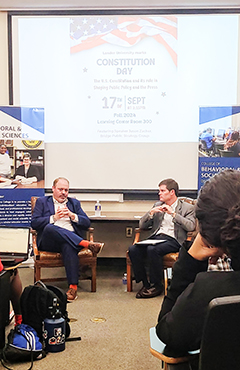
Lander students, faculty, staff and community members came together to celebrate Constitution Day with an engaging discussion led by Jason Zacher, president of Bridge Public Strategy Group.
The event took place on Tuesday, September 17, in the Carnell Learning Center, where Dr. Lucas McMillan, dean of the College of Behavioral and Social Sciences, guided Zacher through an exploration of the U.S. Constitution’s influence on state and national policy, as well as its impact on the press.
Zacher, drawing from his diverse career experience as a journalist, PR consultant, and government relations expert, shared his insights on the Constitution's relevance in today’s society.
He emphasized that the Constitution safeguards citizens by ensuring their rights, such as freedom of speech and the press. He outlined how the Constitution allows journalists to attend public meetings and report on government affairs. He also explained how it protects lobbyists, enabling them to petition the government for assistance with their issues.
“The Constititution is a living document that was created to restrain the power of government,” said Zacher. ”Over the years, it has been shaped by the Supreme Court, and by executive action.”
Zacher touched on the country’s history of polarization and distrust of government, which dates back to the late 1700s when the penny press reported inaccurately on John Adams, one of the Founding Fathers and second President of the United States.
He mentioned that in today’s age of instant technology, such as cell phones and social media, there can sometimes be an exacerbation of hate and the belief that there is “only one truth” in the world, as well as the idea that “any other opinions are wrong.”
To combat this division, Zacher encouraged students to get their news from legitimate sources, to “get away from the screens,” and to “meet people and understand that most people are really good at heart.”
“The vast majority of things that impact your life happen at city council, county council, and the state house,” he noted. “If you want to make a difference, get involved in your local community – whatever that is.”
Zacher encouraged students to volunteer for nonprofits, connect with their church, help local candidates with campaigns, work with the chamber of commerce, or join the local school board.
“Beyond that, the cool thing about a college campus is that you end up interacting with all kinds of people from all walks of life that you probably would not have thought you would have,” he said. “Once you get out of college, you will fall in with a group, and you have to make sure that you go to lunch with someone who doesn’t look like you, doesn’t believe like you.”
“Get involved. Meet other folks in the community that you would not meet otherwise. That’s how you build things back,” he continued. “It’s a grassroots level that I hope, eventually, Gen Z will figure it out.”